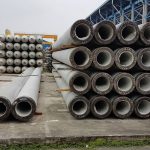Every exporter has one primary goal: to deliver export commodities safely and intact until they reach the buyer. However, the process linternational logisticsLong and risky shipping often creates a sense of anxiety and uncertainty. Will the commodity be damaged? Will it be lost in transit? Will claims be approved if something happens? These concerns often arise from a lack of understanding about marine cargo insurance which can actually provide comprehensive protection. This article will be a comprehensive guide to alleviating these anxieties, by introducing the various types of Marine Cargo Insurance and the importance of choosing the one that suits your commodity.
We will discuss in detail the types of insurance policy, as well as a crucial role of insurance brokers like L&G Insurance Broker in helping you find the most appropriate solution. This is an essential guide for any export business owner looking to secure their assets and reputation with freight insurance.
Understanding the Main Categories: Institute Cargo Clauses (ICC)
In this world, cargo insurance policies generally refer to global standards known asInstitute Cargo Clauses (ICC). Understanding the differences between the three main types is a crucial first step for any exporter.
- Institute Cargo Clauses (ICC) “C”: Limited Coverage
This is the most basic and minimalist coverage.ICC “C”only protects commodities against very specific and most severe risks. The risks covered include:- Fire or explosion.
- The ship or barge ran aground, capsized, or sank.
- Collision or contact of a ship with an external object other than water.
- Unloading of cargo at the emergency port.
- Damage due toGeneral Average.
- Damage due toJettison(cargo dumping into the sea).
- This policy is strongly discouraged for sensitive or high-value export commodities, as it does not cover common risks such as theft, robbery, or weather damage. ICC “C”is often a decision based on the desire to save on premium costs, but can result in much greater financial losses.
- Institute Cargo Clauses (ICC) “B”: Intermediate Coverage
This coverage is a little bit broader than ICC “C”. In addition to all the risks covered byICC “C”, ICC “B” also bear additional risks, such as:- Earthquakes, volcanic eruptions, or lightning strikes.
- Damage caused by sea, lake or river water entering the ship or container.
- Total loss of any package that falls from the ship or falls during loading or unloading.
- However, it should be noted that theft and risks due to container sweat (condensation) are still not included in this coverage. PolicyICC “B” is suitable for more resilient commodities, but still not recommended for commodities that are sensitive to humidity or have a fragile selling value.
- Institute Cargo Clauses (ICC) “A”: Broadest Coverage
This is the coverage”All Risks” the most comprehensive.Polis ICC “A”protects the commodity from all physical risks occurring during shipment, except those explicitly excluded. Common exceptions include damage due to war, terrorism, or risks that existed before shipment.ICC “A”is the best choice for exporters who wantmaximum protection and peace of mindtotal. This is the gold standard in marine cargo insurance.
Why Choosing Commodity-Based Insurance Is Key?
Each commodity has unique characteristics and risks that must be considered. Choosing the type insurance policy Inappropriate use can have fatal consequences. Here are specific examples based on commodity type:
- Tea, Coffee, and Cocoa (Sensitive Commodities): This commodity is highly susceptible to risks not covered by basic policies, such as moisture damage and flavor contamination. Moisture can encourage mold growth, while contamination can impair flavor quality. For tea and coffee exporters, damage due to sea water can destroy the entire cargo. Therefore, the coverageICC “A” is an absolute must. This policy can be extended to cover quality-related risks, such as loss of flavor or aroma due to cross-contamination.
- Nickel and Minerals (Heavy Commodities): While minerals like nickel may appear sturdy, they pose unique risks, such as rust or damage from shocks during transit. Overweight cargo can also pose a risk to ship stability. Nickel exporters must ensureTheir insurance policies cover these risks, as well as environmental liability risks in the event of a spill or other incident. Here, freight insurance must be tailored to specific industry needs.
- Manufactured Products and Electronics (High Value Commodities): These products have a high risk of theft and are highly susceptible to physical damage. Therefore,marine cargo insurancethe selected one must have coverage “All Risks” (ICC “A”) is strong. Protection from partial theft (pilferage) and damage due to improper handling is very important to maintain the value of the product.
The Crucial Role of Insurance Brokers and L&G Insurance Brokers
Specifying the type insurance oil the right one from the many options available can be very confusing. This is why the role of insurance brokerbecome very important. Ainsurance broker not working for one company insurance, but rather for exporters. They are expert consultants who have in-depth knowledge of the market.marine cargo insurance and can provide independent advice.
How Can L&G Insurance Broker Help You?
- In-depth Risk Analysis: L&G Insurance Broker will work with you to analyze the unique characteristics of the exported commodity, shipping route, and applicable Incoterms. They will help you identify all potential risks and design a program.insurance appropriate. This ensures that each of your shipments has cargo insurance right on target.
- Access to Global Insurance Markets: L&G Insurance Broker have a wide network with various companiesinsurancelocal and international. This allows them to get the best deals and coverage that best suits your specific needs, even for difficult-to-insure risks.
- Professional Negotiation: With their negotiation skills, L&G Insurance Broker can help you get more competitive premiums and terms police insurance which is more profitable.
- Claims Assistance: When an incident occurs, the team L&G Insurance Broker will be your partner, helping you manage the entire claims process, from document collection to final negotiations with the company.insurance. This is an added value that cannot be found when purchasing insurance directly.
Understanding the types of Marine Cargo Insurance is a good first step, but taking concrete action is key to securing your business. Ignoring shipping risks is the same as leaving your assets at risk. The risk of financial loss from a hidden disaster can far outweigh the cost of the premium.
Contact L&G Insurance Broker now at 08118507773 for a free consultation before the risks haunt your business.
Strategies for Choosing the Right Police
Here are some practical steps to choosemarine cargo insurance policythe right one, ensuring you have maximum protection:
- Conduct an Internal Risk Audit: Identify all potential risks your commodity may face during transit. Is your commodity fragile? Is it sensitive to humidity? Is it at risk of theft? The answers to these questions will form the basis for selecting the type of shipping container.insurance right.
- Pahami Incoterms: Incoterms determine who is responsible for insuring the cargo. For example, in CFR (Cost and Freight) or FOB (Free on Board), the responsibility for cargo insurance can be transferred to the buyer. However, inCIF (Cost, Insurance and Freight),responsible exporters. Understanding this is crucial to avoiding protection gaps.
- Determine Accurate Insurance Value: Ensure the value of the goods is calculated accurately. Consider not only the value of the goods themselves, but also shipping costs, insurance costs, and expected profit. Inaccurate coverage could result in you receiving only a fraction of the loss in a claim.
- Read the Policy Carefully: After receiving an offer, make sure you understand all the clauses in the agreement. insurance policy, including exceptions and limitations.Insurance broker will help you through this process, explaining each point clearly so you know exactly what is covered and what is not.
Conclusion
Anxiety is a natural response to uncontrolled risk. However, in the export business, this risk can be turned into assurance by selecting the right one.Marine Cargo Insurance the right one. Understanding the type’s insurance policy and choosing the one that suits the commodity being exported is a fundamental step to ensure maximum protection.
To ensure exporters make smart choices, guidance from insurance broker experienced, such as L&G Insurance Broker, is a non-negotiable investment. By partnering with insurance brokers, exporters can focus on business growth, leaving worries about risks in the hands of experts.Export without worry is now a reality.
Source:
- https://ligaasuransi.com/hal-hal-yang-perlu-anda-ketahui-sebelum-membeli-asuransi-marine-cargo/
- https://www.rpx.co.id/blog/10-komoditas-ekspor-indonesia-terpopuler-dan-penopang-devisa-id
—
DON’T WASTE YOUR TIME AND SECURE YOUR FINANCIAL AND BUSINESS WITH THE RIGHT INSURANCE.
HOTLINE L&G 24 JAM: 0811-8507-773 (CALL – WHATSAPP – SMS)
Website: lngrisk.co.id
Email: halo@lngrisk.co.id
—



















